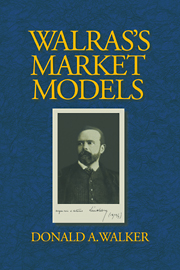Book contents
- Frontmatter
- Contents
- List of figures
- Preface
- Acknowledgments
- Introduction
- Part I The models of the mature phase
- 1 Walras's conception of a competitive market economy
- 2 The mature models: Not a normative scheme
- 3 The mature models of the barter of stocks of commodities
- 4 Institutions and participants in the model of monetary oral pledges markets
- 5 Disequilibrium and equilibrium in the model of monetary oral pledges markets
- 6 The structure of the mature nondurable consumer commodities model
- 7 The equilibrating processes in the mature nondurable consumer commodities model
- 8 The structure of the mature comprehensive model
- 9 The equilibrating processes in the mature comprehensive model
- 10 Walras and his critics on the maximum utility of new capital goods
- 11 The mature models of the money market
- 12 Iteration in the mature model of tatonnement
- 13 The mature model of the behavior of the entrepreneur
- 14 Walras versus Edgeworth on tatonnement processes
- Part II The models of the phase of decline
- References
- Collation of editions of the Eléments
- Index
2 - The mature models: Not a normative scheme
Published online by Cambridge University Press: 05 May 2010
- Frontmatter
- Contents
- List of figures
- Preface
- Acknowledgments
- Introduction
- Part I The models of the mature phase
- 1 Walras's conception of a competitive market economy
- 2 The mature models: Not a normative scheme
- 3 The mature models of the barter of stocks of commodities
- 4 Institutions and participants in the model of monetary oral pledges markets
- 5 Disequilibrium and equilibrium in the model of monetary oral pledges markets
- 6 The structure of the mature nondurable consumer commodities model
- 7 The equilibrating processes in the mature nondurable consumer commodities model
- 8 The structure of the mature comprehensive model
- 9 The equilibrating processes in the mature comprehensive model
- 10 Walras and his critics on the maximum utility of new capital goods
- 11 The mature models of the money market
- 12 Iteration in the mature model of tatonnement
- 13 The mature model of the behavior of the entrepreneur
- 14 Walras versus Edgeworth on tatonnement processes
- Part II The models of the phase of decline
- References
- Collation of editions of the Eléments
- Index
Summary
Introduction
Jaffé's thesis
This chapter examines Walras's motives in constructing the models of his phase of maturity. It is a commonplace of writing on the history of economic thought that the work of one or another economist is alleged to have a normative bias in the sense that values and prejudices embedded in his ideational process and philosophical outlook have crept into his work without the writer being conscious of their influence. It is often maintained, for example, that value judgments operate in determining the selection of problems that a scientist finds interesting, or that a writer's treatment of his subject is affected by his being a member of a particular social class. The allegation made by William Jaffé about Walras's work was, however, of a different character, for he asserted that in developing the theory of general equilibrium in the Eléments, Walras consciously had the objective of constructing a normative system. Jaffé made that allegation about the constructions of Walras's creative phase and therefore about the models that Walras presented during his mature phase. Jaffé maintained that Walras's “latent purpose” was not “to describe or analyze the working of the economic system as it existed, nor primarily to portray the purely economic relations within a network of markets under the assumption of a theoretically perfect regime of free competition” (Jaffé 1977d, p. 386 [340]).
- Type
- Chapter
- Information
- Walras's Market Models , pp. 29 - 52Publisher: Cambridge University PressPrint publication year: 1996



